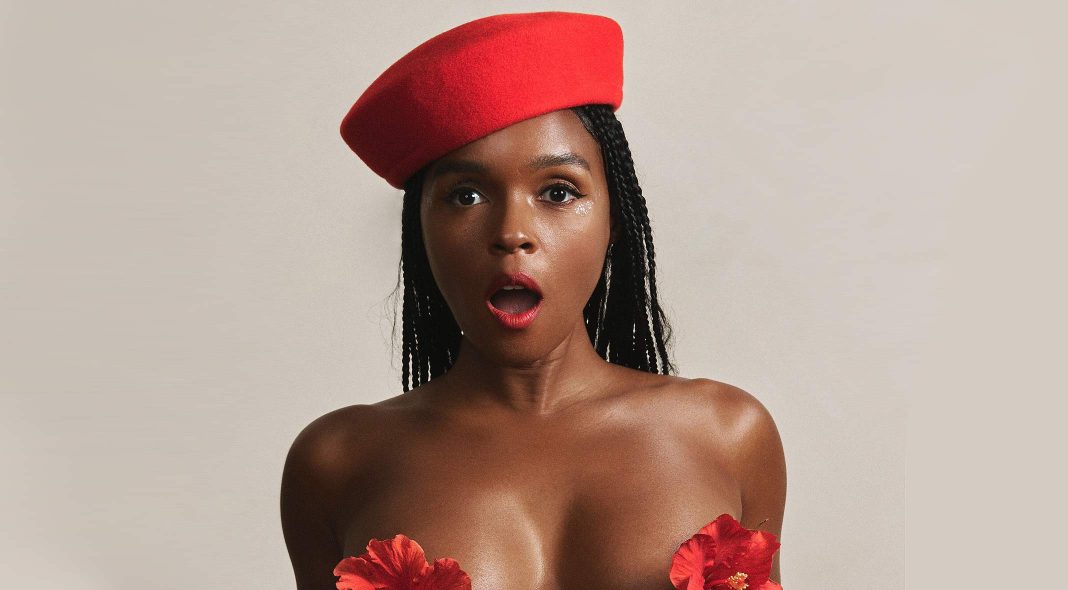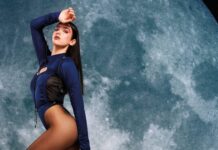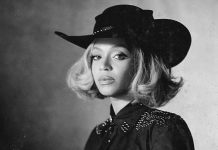As long as there have been pop stars, there has been scandal about their sexuality. Whether they’ve got too much on show (or not enough), whether they’re hiding who they love (or talking about it too much), whether they’re using it as a marketing tool to cover up for any cracks in their talent. It’s a tired conversation, and one in which women and non-binary folk tend to lose out the most, constantly beholden to impossible standards of what it means to be desirable and cool.
When it comes to Janelle Monáe though, there can be no conceding. Not freeing the nipple so much as the entire boob, the maverick popstar has celebrated the release of their new single ‘Lipstick Lover’ with both a much-talked-about chest-baring live performance, and a stunningly-shot music video, celebrating sexual liberation in a tropical riot of colour. Their first music since coming out as non-binary in 2022, ‘Lipstick Lover’ is the first taste of Monae’s upcoming fourth album ‘The Age Of Pleasure’, which they described to Zane Lowe as “a love letter to the diaspora”.
As is often the case, Monae’s nakedness has deeply divided the crowd. Where many have praised ‘Lipstick Lover’ for its freedom and giddy celebration of Black bodies, (including shout-out thirst-tweets from Cardi B and SZA), others seem deeply put off, feeling that by exposing their body, Monae has somehow let their fans down. Many have mentioned Monae’s original conceptual presentation — a sharp suit-wearing android named Cindi — saddened that they have seemingly sold out to an industry that trades on NSFW shock value. Little attention has been paid to the fact that queer liberation is a train that Monae has been on for some time; did nobody see the music video for ‘Dirty Computer’’s ‘Pynk’, with those exceptional vulva-themed trousers?
Indeed, the part that people aren’t always saying out loud does hint at a wider issue with unapologetic queerness. Whilst R&B artists like Chlöe have faced backlash for being too grown or sexual in their music, we broadly accept that video vixens writhing around for heteronormative male attention is part and parcel of visual music consumption. We’re even starting to (slowly) come around to the idea of women making explicitly sexual songs, as long as they are using male pronouns when they talk about who they’re like to get down and dirty with.
But when it’s women talking about women, or non-binary artists expressing love, affection and sex, there is still an assumption that the artists involved are merely doing it for headline-grabbing titillation. We saw it with the moral panic around Sam Smith’s ‘Unholy‘ or Megan Thee Stallion and Cardi B’s ‘WAP’, and we’re also seeing it in lesser action right now with Victoria Monet, an artist who by all accounts should be huge, but whose openly bisexual bops have arguably not been given the mainstream support they deserve. Understanding of sexual autonomies have come a long way, but it seems like many are still uncomfortable around femme-presenting folk who don’t mind talking about or showing their sexual self-embodiment.
The idea that Janelle Monáe has somehow traded in their integrity is also interesting, speaking to the unhealthy ways in which we don’t always give our favourite artists space to express different sides of themselves. As one Instagram commenter put it “I always thought you were so classy and such a lady. Your intelligence and the way you carried yourself… this video just changed my opinion of you in the worst way.” Problematic gender labelling aside, the idea of equating nakedness with unintelligence is pretty boring, contributing to unhealthy narratives that suggest an artist can only make something of worth if they are covered up. Janelle Monáe has always been, frankly, one of the most stunning artists you could ever hope to lay your eyes upon, but it’s been incredibly telling how differently they are received when they are seen with less clothes. There’s a darker side of consent and power play to consider in all this too; why is it that so many of us are content to gossip about sex tapes or leaked paparazzi beach shots, but get turned off at the idea of an artist ‘flaunting’ sexual material on their own terms?
In the same way that Sam Smith’s vocals were praised when they were presenting as masculine and daytime-radio inoffensive, we tend to embrace artists that we see as conservatively safe (Adele, Taylor Swift), struggling to adjust when they express anything else (basically any Disney star in their coming of age). In breaking onto the scene in the same year as Rihanna’s ‘Rudeboy’, it seems that many fans placed a lot of stock in the idea of Janelle Monáe as some sort of respectable androgynous robot alternative, a crusader for modest values in the age of MTV raunch. Moving towards a sexier aesthetic doesn’t mean that the 2010’s ‘Archandroid’ era was any less genuine, but that Monae – a fully-grown adult – now has different stories to tell, different forms of ‘otherness’ to explore.
As the reaction from Monáe’s own mom shows, to focus too much on the booty as a sexual form is to miss what else ‘Lipstick Lover’ achieves. Completely in-line with her ongoing love of 70s funk and soul, it’s a real song for the summer, a way of normalising self-acceptance in all its forms. Alongside the vibrators, foot licking and tongue kissing, we’re also introduced to a range of Black bodies at peace, feeling the freedom of ageing skin in ways that are not often depicted in the media. If you let yourself, you can feel the release of swimming through cool water without a care, of twitching your hips to the joy of feel-good reggae. The messages of the video will be amplified if you’re queer, but the age of pleasure is not designed to be exclusive, if you’re willing to open your mind.
If none of that appeals to you, that’s fine too. For those who want to pretend that Monáe’s career ended with ‘The Archandroid’, copies of that album are still freely available, still enjoyable 13 years on from its initial release. But it isn’t Monáe’s fault that you haven’t been paying attention to their evolution since then, or that you might prefer them to stay in one place. To claim this new era as distasteful may be your personal prerogative, but to label it a sell-out is to entirely miss the power that this kind of autonomous, defiant presentation holds. At a time where LGBTQIA+ culture is being cast as deviant and dangerous right around the world, Monáe’s unapologetic empowerment may well end up being their most politically-powerful act to date.
Janelle Monáe is on tour in the US from August 11 until October. Get tickets.







